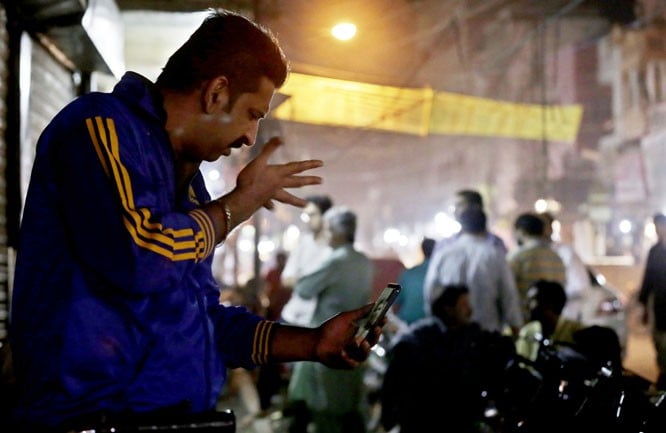
"Yaku chai wala" continues to attract, among its loyal customer base, a ‘unique’ group of people -- the hearing and speech impaired

As the sun sets in Lahore, nature’s silence wraps itself around the city -- a sudden suspension, a stillness between two worlds.
Post eight in the evening, the city streets once again become an intense mosh pit of activity not meant for the timid. Thundering public transport, smoking rickshaws, colourful stalls springing up on the roadsides, benches laid down in front of hotels, and a long lane of vehicles parked in any space left vacant on the side of the road -- everyone vies for every inch of available asphalt.
As darkness envelopes the city in its embrace the residents throng the streets to meet it. Amongst the flurry of activity, time seems to move slowly for a group of people resting and sipping tea in a corner of a humble tea stall at Puondpura Chowk, Temple Road.
The tea culture is very much alive in this part of the city, although many tea stalls are actually roadside tea shops. Locals gather at these joints after work or school to chat, exchange news, and to feel a part of a community. But this tea stall is providing that same sense of community for another group of people -- the hearing and speech impaired.
Unlike other stands, the owner, the waiters and most of their customers converse in sign language. "Yaku chai wala," or "Goongah chai wala" was originally set up as a way to simply earn a living by Abdul Razzak Yaqoob right before the partition. But what Yaqoob quickly discovered was that his tea stall attracted a group of unique customers (differently-abled) from adjoining areas. Soon the word was out, and over time a community started to build at the dhaba as other differently-abled people began to frequent the place.
Zafar Iqbal, who took over the business from his father, recalls that at first he "probably felt weird [being] in the midst of a bunch of silent people talking with gesturing hands all over. But now the regulars gather around, every evening, with a great sense of community."
Open 24/7, the stall is without a door or a shutter, and serves tea and buns plastered with eggs round the clock. For many customers who visit the
rustic and lively dhaba as a ‘partial’ solution for a missed meal, it’s an eagerly anticipated ritual repeated on every subsequent visit.
"Our stall even remained open during the 1965 war, when Lahore was on a high alert and no one was allowed to switch on lights after dusk," says the proud son, as he acrobatically mixes the tea.
"Why need a door when the shop is never to be closed," he asks.
"We come here to vent our anger with people with whom we share the same disability," says the waiter who translates what Salman Haider, the de facto leader of a group consisting of young speak and the hearing impaired males who are now tired of scouting for jobs, and middle-aged as well as old men who have stopped looking beyond.
Between periods of intense discussions over their hardships, the group breaks into a fit of hysterical laughter as someone shares a raunchy joke, bugs another within the group, while the older ones skim through newspapers, and discuss politics.
Listening to them and their problems one is often hit with an upsurge of guilt for the collective societal apathy we’ve shown towards the differently-abled people by placing barriers for persons with disability not just in Pakistan but in every single developed and developing country.
By segregating them away from the rest of society, institutions were promoted as the best way to ‘accommodate’ this population, which might well be the reason why we see the differently-abled community underrepresented in the workforce, being three times less likely to be employed.
Our society has expectations of how much people should be able to achieve, expectations that were created for able-bodied people. This leaves many disabled people as long-term beneficiaries and not that far above the poverty line because it’s not easy to find employment.
Although Pakistan ratified the Convention on the Rights of Persons with Disabilities (CRPD) in 2011, underlining the government’s commitment to protecting the civil, political, social and economic rights of persons with disabilities, not much has changed since. Millions of persons with disabilities in Pakistan are still excluded from schools and universities, jobs, healthcare and rehabilitation, and mechanisms for redress. They exist instead as a vulnerable group -- unheard, and mostly unseen.
Spending time at Yaku ka dhaba one realises that people shouldn’t have to experience disability to learn about the issues. Instead, we should create spaces, debates, and resources
that are accessible, and also give voice to those
who’ve been treated as vulnerable. It shouldn’t just be an acknowledgement of
how tough it is to be disabled.
As the clock strikes 12 midnight, the old among the group beg their leave and are escorted by family members waiting for them a few steps away. The young lot hits the nearby snooker club for a championship night. The group bids each other goodbye.
Even in their absence the stove inside the dhaba keeps burning. Traditions which like the dhaba’s frequent customers, shall live on as a familiar and welcome scene on the streets of Lahore.